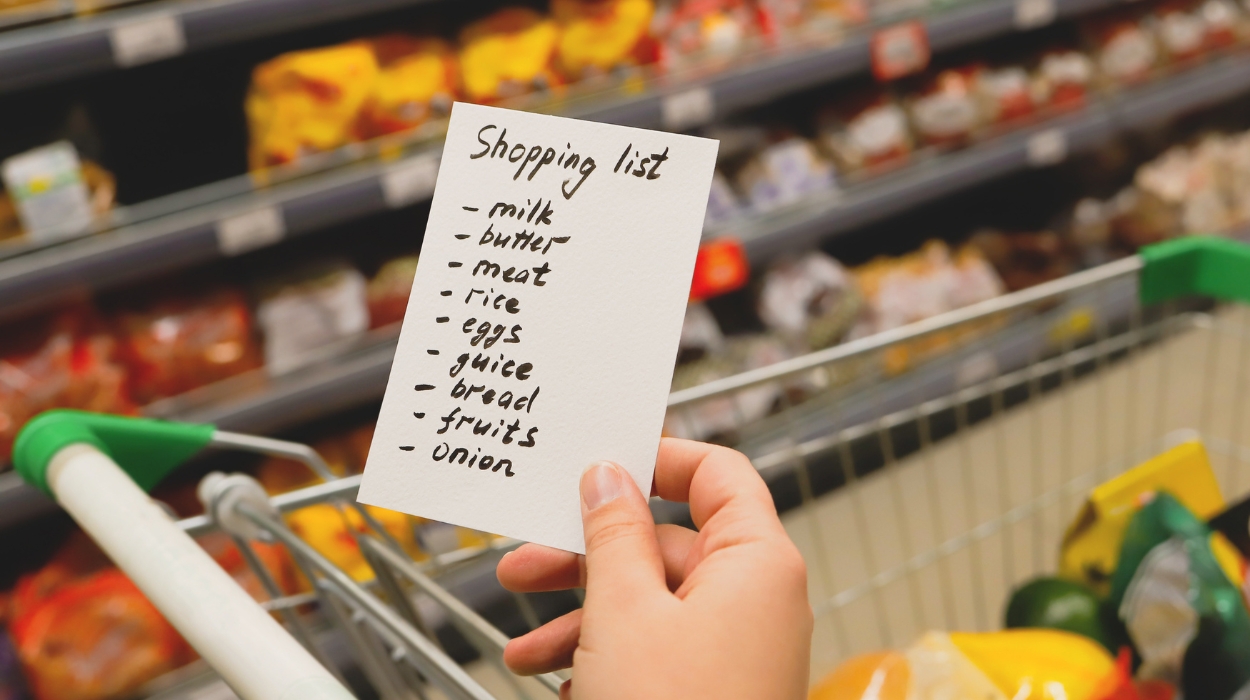 Expert's opinion
Expert's opinion
Expert's opinion
The article is a subjective view on this topic written by writers specializing in medical writing.
It may reflect on a personal journey surrounding struggles with an illness or medical condition, involve product comparisons, diet considerations, or other health-related opinions.
Although the view is entirely that of the writer, it is based on academic experiences and scientific research they have conducted; it is fact-checked by a team of degreed medical experts, and validated by sources attached to the article.
The numbers in parenthesis (1,2,3) will take you to clickable links to related scientific papers.
How To Eat Healthy On A Budget And Lose Weight: 15 Tips To Follow 2024

Shedding pounds is high priced. But the costs need not be as hefty as you might think. Membership at the gym may not be affordable or the weight loss programs may cost you a fortune. Losing weight can be hard and eating healthy can be expensive. But what If I said to you that it is possible to eat on a tight budget without having to sacrifice nutrition? With thorough wisdom and discipline, you can be your dietician and personal trainer. Here are 15 tips to eat healthy on a tight budget that will help you lose weight.
15 Best Weight Loss Tips With Healthy Eating On A Budget
- Home-cooked food
- Budget-friendly sources of protein
- Eat as the Japanese do
- Pump up the water
- Go grocery shopping with a proper list
- Make your protein bars
- Make use of leftovers
- Try natural fat burners
- Buy whole foods in bulk
- Intermittent fasting can save money
- Buy seasonal foods at a farmers’ market
- Meal plan for weight loss
- Easy recipe ideas for a healthy meal
- Spice it up
- Mindful eating
15 Tips On How To Eat Healthy On A Budget And Lose Weight
By making small lifestyle changes, one can save a lot of money and make their habit of healthy eating more affordable and sustainable. Here is a list of things you can follow to save money while eating healthy and nutritious foods.
Home-cooked food
Cooking at home can save you a good amount of money. An average American eats out four to five times a week. This is equal to 18.2 commercially prepared meals. And this can cost you an arm and leg without coming to our notice. Simply put, cooking at home is more economical than dining out. A family of four can be fed for the same price of food that feeds one or two at a restaurant.
Make a habit to eat home-cooked food and avoid eating out in the nick of time. Meal prep is a great way to save time. You can cook for the entire week on the weekends or cook fresh meals once a day. However, keep in mind that pre-sliced or pre-cooked foods cost a lot more. By doing the prep work by yourself, you can save a lot of money. So meal prep is an easy way to cook at home. By cooking yourself, you can have control over the ingredients, which otherwise is not possible when consuming at a restaurant.
Budget-friendly sources of protein
Protein does not have to always come from meat. Since most meat can be expensive, look for affordable protein sources for nutritious meals. Protein-rich foods like eggs, lentils, and legumes contain fiber and protein. This combo is very satiating. Protein-rich foods like quinoa, tofu, tempeh, teff, cottage cheese, and yogurt are also excellent choices. Also, consume lots of fruits and vegetables.
Fruits like guava, avocado, apricots, jackfruit, kiwi, and raisins, berries like blackberries, and raspberries are some rich sources of protein. You can also opt for plant-based protein sources. Some protein-rich sources of plant-based protein are lentils, chickpeas, fava beans, pinto beans, lima beans, green beans, and mung beans. Moreover, dry raw beans cost you much less than canned beans. These fruits and vegetables are budget-friendly and filling. As a result, you can save money on your overall food bill.
Eat as the Japanese do
Japanese are known for their thin bodies and great food habits. Their tradition believes in consuming simple, fresh, and seasonal foods. Their eating pattern offers numerous health benefits, especially weight loss. Their meals are full of minimally processed foods, fresh and seasonal, that are rich in nutritional value with very few amounts of sugars and fats. Their diet promotes seafood, fish, seaweed, grains, green veggies, soy, fruits, and vegetables. It also includes minimal amounts of light carbs like rice and noodles.
They consume foods that are steamed and boiled rather than deep-fried. They also consume soups, stews, and herbal teas to keep their metabolism high. Add lots of beans, vegetables, and tofu to make a large bowl of soup that’s rich in protein and also keeps you full for a longer time. Overall, the Japanese balanced diet is ideal for weight loss and healthy weight management without shelling out a lot of money.
Pump up the water
Let water be your go-to beverage. This calorie-free drink quenches thirst without adding up calories. When 60% of our body is composed of water, then our body needs lots of it to function properly. Drink at least 8 glasses of water a day. If you don’t like it plain, drink infused water with your favorite fruits and herbs. Replacing the morning coffee or a soda with zero-calorie water can save money between 2 to 5 dollars a day. Which sums to a whopping 60 to 150 dollars a month.
Drink herbal teas which add some refreshing flavor. You can pluck some fresh herbs or flowers to make herbal teas. Lemon tea, green tea, ginger tea, cumin tea, hibiscus tea, and peppermint tea are some of the popular options for you to try. Make sure to not add any sweeteners as this will add up a lot of calories.
Go grocery shopping with a proper list

Most people get easily sidetracked at the grocery store and buy stuff that is not healthy or unnecessary. Go with a planned list of groceries instead of wandering through with a vague idea of what to buy. Once you have planned what to eat for the week, stick to the plan and shop wisely according to the shopping list. This will help you stick to the budget and a healthy diet plan.
Before a grocery trip, make a brief list of healthy foods that you would normally reach out for. Go with the regular foods, so that you know what you like and you can prevent food wastage as well. Keep the list simple like fruits, vegetables, nuts, whole grains, and legumes. You can pick the ones on sale at the grocery store. You can also go with the seasonal ones to have both flavor and nutrition.
Make your protein bars
Protein bars can cost you an arm and leg. You do not have to spend so much on them when you can make one at home for a much lesser price. If you prepare protein bars by yourself you will certainly save a good amount of money. All you need is nuts and seeds that are rich in protein like almonds, walnuts, brazil nuts, hazelnuts, raisins, pinenuts, chia seeds, flax seeds, sunflower seeds, pumpkin seeds, and some dates.
You can make granola bars, oatmeal bars, dry fruit nut bars, and protein clusters. By making your protein bar you know what you are consuming while also saving a lot of money. Find help from your mom or Martha Stewart for DIY protein bar recipes.
Make use of leftovers
Food wastage is nothing but wasted money. Before you shop for groceries or order a takeaway, try to use up the leftover food in the fridge and pantry. If you find any fruits that are about to be spoiled, make a scrumptious shake out of them. All you need to do is be creative and you will find so many ways to make a full meal out of little leftovers. Do not stress on the food that is nearing the expiry, try to freeze it and enjoy it later to reduce food waste.
Here are a couple of hacks that may come in handy. Repurpose your boiled veggie water to use as a broth or make soup by throwing in some quinoa and veggies. Turn your lunch into dinner. Dedicate a night to leftovers.
Try natural fat burners
Fat burners have always been a debatable topic. But these natural supplements are here to help you for sure. These natural supplements can boost your metabolism, lower fat absorption, and increase energy expenditure by burning more fat for fuel. Natural supplements like caffeine, green tea extract, and green coffee bean extract are some great choices. Soluble fibers like glucomannan and psyllium husk are great too.
A type of omega-6 fatty acid called conjugated linoleic acid is known to cause modest weight loss. Garcinia cambogia is a popular supplement to lose weight. It is made from the extracts of garcinia gummi-gutta fruit. High amounts of HCA are linked to weight loss[1]. Invest in any of these that fit your budget.
Buy whole foods in bulk
Always buy foods in bulk, as some products are priced more in smaller quantities. So, compare the price and if you notice that it is priced less in larger quantities, then buy the regular foods in bulk. Moreover, some foods are priced less when you buy in whole or in less processed form. For example, peeled and chopped veggies cost more than whole vegetables.
They might make you spend some elbow grease, but it is worth it if it can save you some money. A block of cheese is more affordable than shredded cheese. And, canned beans are more expensive than whole uncooked beans. Furthermore, refried beans are more expensive than canned ones. Overall, less processed foods are mostly sold in bulk, give more servings, and save money.
Intermittent fasting can save money

Did you know that people lose weight during Ramadan fast? Yes, Ramadan fast is a form of intermittent fasting. It is an eating pattern that has cycles of eating and fasting periods. It does not restrict what you eat but stresses when to eat. Moreover, due to the restricted time of eating window one naturally consumes fewer calories. Restricted calories lead to less money spent and less food consumed. You can also skip breakfast or a few meals in a week.
Intermittent fasting is a powerful tool for people looking to lose weight. There are several methods of intermittent fasting. Pick the one that suits you best. It is also known to reduce belly fat. And, the overall hormonal changes in the body due to intermittent fasting can increase the metabolic rate[2] and help with losing weight.
Buy seasonal foods at a farmers’ market
Instead of spending money on expensive produce at high-end grocery stores, try to buy fresh produce from your local farmers’ market. These are in-season and fresh food that is rich in flavor and nutrients. Plus, they also come at the lowest cost. Take a tour of the farmer’s market and find what is in season. You can also consider going late and shopping before closing time. In this case, you can do respectful bargaining or they might quote a lesser price. Stick to the same vendors that you like to buy from regularly.
Buy fresh and non-starchy vegetables like cabbage, asparagus, or leafy greens as they are low-calorie veggies that promote fullness. Go for tomatoes and zucchini in summer, and cruciferous vegetables in winter.
Meal plan for weight loss
A meal plan can be a potent tool if you aim to lose weight. If done right, meal plans can help you curate a perfect calorie-deficit diet along with keeping it nutrition-dense. Planning it beforehand can also make the process simpler and save you time. Include plenty of proteins and fiber[3], as this will keep you fuller for a longer time, and they also reduce cravings.
Limit sugar, salty, deep-fried, and processed foods. They are low in nutrients and rich in calories. Fill one-third of the plate with non-starchy vegetables as they are low in calories and rich in fiber and water. Fill the rest one-third of the plate with meat, eggs, fish, and tofu. Lastly, add healthy fats like olives, avocado, nuts, and seeds.
Easy recipe ideas for a healthy meal
Soups are easy to cook and can be frozen in individual portions. Make sure to add lots of veggies, quinoa, eggs, meat, and lentils. Make a pizza with a whole grain wheat crust, and add your favorite toppings along with meat, sauce, and seasonings. Salads can be a great choice to lose weight. Experiment with a variety of dressings, toppings, whole grains, sprouts, nuts, and seeds.
Make fresh fruit smoothies without adding extra sugar. Drink lots of fresh fruit juices. Try grain bowls that are rich in nutritional value, batch-cooked grains like brown rice and quinoa, topped with dressing, and proteins such as eggs, chicken, and veggies.
Spice it up
There are some spices and herbs that help you lose weight[4]. Fenugreek, turmeric, ginseng, black pepper, cinnamon, ginger, cayenne pepper, oregano, cumin, and cardamom are known to help you lose weight. Pick the spices and herbs that fit your budget, use them in herbal teas, and also include them in meals.
These spices are known to reduce appetite, promote fullness, boost metabolism, and increase energy expenditure. Also, some spices are known to balance hormones and regulate blood sugar levels and improve overall health and induce weight loss.
Mindful eating
This is a Buddhist concept based on mindfulness. It helps you gain control over your eating pattern and habits. It has been proven to promote weight loss, curb binge eating, and combat eating disorders. It is a form of meditation that helps you cope with physical sensations and emotions. Mindful eating is a state of full attention to your cravings, experiences, and physical cues while eating.
Mindful eating involves differentiating between true hunger and non-hunger triggers, engaging your senses like smell, color, and texture of food. It promotes eating slowly without distractions, responding to physical hunger cues, and eating only until you are full.
Mindful eating can help you recognize physical hunger and fullness cues. So, one can differentiate between emotional, true, and physical hunger. Research[5] shows mindful eating reduces food cravings, body mass index, and body weight.
More Tips For Weight Loss On A Tight Budget
Along with healthy eating and restricting calories, two other major factors contribute to weight loss. They are having adequate sleep and physical activity. These both play a crucial role in balancing your hormones. Let us see how they impact our weight loss goals.
Sleep for weight loss
Having enough sleep can suppress hunger. At the same time, poor sleeping habits can increase food cravings and calorie intake due to snacking late at night. Adequate sleep can signal the brain to produce fullness hormone. Poor sleep can lead to increased production of a hunger hormone and decreased production of leptin hormone.
Inadequate sleep can also lead to insulin resistance, which can further lead to weight gain. Overall, cultivating healthy sleeping habits can help us maintain optimal weight.
Physical workout for weight loss
One should follow a physical workout routine to stay fit. The fitness of the body can improve overall health as much as healthy eating does. Building muscle mass and endurance can help you stay fit. Workouts like swimming, dancing, jogging, hiking, and cycling can also boost stamina. Additionally, you can also play your favorite sports to burn some calories.
Cardio workouts can help you improve endurance. Whereas, weight training can build muscle. Find your interest and start your fitness journey.
Final Words
By following the above-mentioned tips, you not only lose weight, but you can save a lot of money. A tight budget should never stop you from losing weight and having a healthy lifestyle. There are many nutritious substitutes for expensive healthy meals. Through conscious choices, one can lose weight even on a tight budget.
+ 5 sources
Health Canal avoids using tertiary references. We have strict sourcing guidelines and rely on peer-reviewed studies, academic researches from medical associations and institutions. To ensure the accuracy of articles in Health Canal, you can read more about the editorial process here
- Ruchi Badoni Semwal, Deepak Kumar Semwal, Ilze Vermaak and Viljoen, A.M. (2015). A comprehensive scientific overview of Garcinia cambogia. [online] 102, pp.134–148. doi:https://doi.org/10.1016/j.fitote.2015.02.012.
- Zauner, C., Schneeweiss, B., Kranz, A., Madl, C., Klaus Ratheiser, Kramer, L., Roth, E., Schneider, B. and Lenz, K. (2000). Resting energy expenditure in short-term starvation is increased as a result of an increase in serum norepinephrine,. [online] 71(6), pp.1511–1515. doi:https://doi.org/10.1093/ajcn/71.6.1511.
- Halton, T.L. and Hu, F.B. (2004). The Effects of High Protein Diets on Thermogenesis, Satiety and Weight Loss: A Critical Review. [online] 23(5), pp.373–385. doi:https://doi.org/10.1080/07315724.2004.10719381.
- Koithan, M. and Niemeyer, K. (2010). Using Herbal Remedies to Maintain Optimal Weight. [online] 6(2), pp.153–154. doi:https://doi.org/10.1016/j.nurpra.2009.12.005.
- Dunn, C., Haubenreiser, M., Johnson, M., Nordby, K., Aggarwal, S., Myer, S. and Cathy Newman Thomas (2018). Mindfulness Approaches and Weight Loss, Weight Maintenance, and Weight Regain. [online] 7(1), pp.37–49. doi:https://doi.org/10.1007/s13679-018-0299-6.



